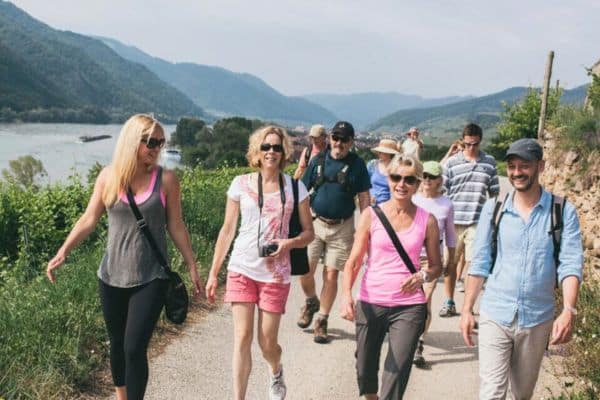Walking trips have evolved far beyond the realm of hardcore backpackers. Today, they offer a delightful blend of adventure and relaxation that appeals to a diverse group of travelers, including many Baby Boomers and Gen Xers. As the Wall Street Journal recently wrote, these journeys provide a unique opportunity to explore new destinations, enjoy low-impact exercise, and experience the local culture in an intimate and immersive way.
Classic Journeys stands out in this trend, offering meticulously planned walking tours that cater to a variety of interests and fitness levels. The company’s guided tours take the hassle out of planning, allowing travelers to fully immerse themselves in the experience. From navigating scenic trails to arranging five-star accommodations, read on to the top 5 reasons why walking tours are growing:
1. Desire For Experiential Travel:

Baby boomers remember the visceral feeling of connectivity they had with locals when they backpacked and Eurorailed across Europe as newly minted college students decades ago. They still crave those feelings and so they are increasingly seeking authentic, immersive experiences when traveling. Walking tours provide a perfect opportunity to engage with local customs, culture, and cuisine in a more intimate way.
Walking tours with Classic Journeys are not just about covering miles; they are about creating memorable experiences. Whether it’s pausing to enjoy a breathtaking view, learning about local history from an expert guide, or savoring a meal at a charming local inn, every moment is crafted to enrich your journey. The tours are designed to be flexible, accommodating the pace and preferences of each traveler, making them an ideal choice for those who love to travel but prefer not to rush.
2. Health And Fitness Benefits:

As health-conscious boomers age, they recognize the importance of staying active. Walking tours offer a low-impact form of exercise that can be tailored to various fitness levels while exploring new destinations. Walking tours provide significant health benefits for aging baby boomers, aligning with their desire to stay active and maintain fitness. Research published in the Journal of the American Heart Association found that older adults who walked for exercise had a 20% lower risk of heart disease and stroke compared to those who were inactive[1]. Additionally, a study in the International Journal of Environmental Research and Public Health demonstrated that walking in nature, a common feature of many tours, can reduce stress and improve cognitive function in older adults[2]. These low-impact, customizable activities allow boomers to explore new destinations while reaping the physical and mental health benefits of regular exercise, making walking tours an ideal choice for health-conscious travelers. As quoted in the Wall Street Journal article:
“Edward Piegza, 58, founder and CEO of Classic Journeys partly attributes the appeal of this kind of travel among health-conscious baby boomers to its fitness benefits. But it isn’t just about reaching “those 10,000 steps,” said Piegza. Rather, it’s the “low-impact form of exercise that’s connected to exploring new destinations.”
[1] Zhao, M., et al. (2021). Journal of the American Heart Association.
[2] Olafsdottir, G., et al. (2020). International Journal of Environmental Research and Public Health.
3. Social Connections:

Walking tours often involve small groups, allowing boomers to meet like-minded travelers and interact with local guides. This satisfies their desire for human connection and authentic experiences. Walking tours often involve small groups, providing baby boomers with opportunities to meet like-minded travelers and interact with local guides, satisfying their desire for human connection and authentic experiences. Research published in the Proceedings of the National Academy of Sciences indicates that social integration and strong social networks are associated with lower mortality rates and improved overall health in older adults. Additionally, a study in the Journal of Aging and Health found that engaging in group activities, such as walking tours, can significantly reduce feelings of loneliness and enhance mental well-being. These social interactions not only enrich the travel experience but also contribute to the overall health and happiness of baby boomers.
Holt-Lunstad, J., et al. (2010). Proceedings of the National Academy of Sciences.Cacioppo, J. T., & Cacioppo, S. (2014). Journal of Aging and Health.
4. Flexibility And Pace:

Walking tours provide a slower, more relaxed pace that allows boomers to fully absorb their surroundings. This aligns with their tendency to take longer trips and unplug more easily while on vacation. Providing the perfect balance between independence and support, travelers can explore at their own pace, guided by local experts who share their knowledge and passion for the region. This setup not only enhances the cultural experience but also provides peace of mind, especially for those with health concerns. For example, if a traveler faces unexpected challenges, such as needing assistance during a hike, Classic Journeys’ guides are equipped to offer immediate help, ensuring safety and comfort throughout the trip. As quoted in the Wall Street Journal article:
“Catherine and Michael Maywood (65 and 64), physicians in the San Diego area, like the way guided walking tours help them meet locals and explore the culture of a place, while still being comfortable. Also appealing: the five-star hotels and special access to tourist attractions that can come with some guided trips. Since the couple no longer has time to plan six-month trips through Southeast Asia as they once did, they appreciate how the guided tours by the company Classic Journeys take all planning out of the equation.”
5. Disposable Income:

Baby boomers generally have more discretionary income to spend on travel experiences. They’re willing to invest in high-quality, expert-led walking tours that offer unique insights and behind-the-scenes access to destinations. Financial stability later in life allows them to allocate substantial funds towards luxury travel experiences that often come with higher price tags, which baby boomers are more capable of affording. And while younger generations may be gaining attention in the travel industry, baby boomers remain a significant force in the luxury travel market.
So, if you’re looking to trade in the usual beach holiday for something more engaging and fulfilling, consider embarking on a walking trip with Classic Journeys. It’s a travel experience that nourishes the body, mind, and soul, leaving you with memories to cherish for a lifetime.





